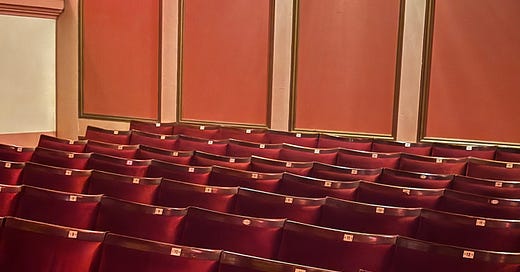I’ve always felt pretty good about my instincts for what is and isn’t a worthwhile movie. More and more, though, I’m wondering whether this is less to do with any innate sense of a film’s quality and more the result of simply surrounding myself with a lot of good curation. I’ve encountered loads of interesting people in various corners of the internet over the years whose recommendations have sent me down strange and rewarding rabbit holes that I almost certainly wouldn’t have found otherwise. And then there’s my own research, my own burrowing, whether that’s leafing through historical festival programmes or end of year lists, or reading and watching and listening to interviews with filmmakers and critics and artists of any kind, talking about the things that have shaped them.
It’s all curation of one kind or another, and one of the most valuable examples I’ve encountered is this interview with Kiyoshi Kurosawa, in which he programmed several of his own films into double-features alongside works by directors he considered to be formative influences. As a fan of his films, this became something of a holy grail, and it pushed me towards the work of Tobe Hooper, Robert Aldrich, and Joseph Losey, which in turn sent me spiralling off in other directions. On and on. One discovery after another.
All of this is to say that whether shared by others or stumbled upon organically, curation is such a vital part of staying curious about pretty much anything. I was reminded of its value this month after coincidentally seeing two back to back films released by the boutique blu-ray label Radiance Films, a serendipitous encounter that, for me, solidified the label’s reputation as a peerless exhumer of overlooked and undervalued cinema.
I’ve picked up a few of their releases since they launched in 2023, but it was the announcement of Shohei Imamura’s The Eel (1997) that really grabbed my attention. I’ve long been aware of the film, but I’ve never been able to track it down. It exists in a hard-to-find Artificial Eye DVD that, by all accounts, doesn’t really do it justice anyway, and it’s this relative scarcity that has reinforced its reputation as the “other” winner of the Palme d’Or in 1997, forever in the shadow of Abbas Kiarostami’s unanimously well-regarded and still widely celebrated Taste of Cherry (1997). I wouldn’t go so far as to say this blu-ray has rescued The Eel from obscurity, but it certainly has given it a new lease of life — which is good, because it’s a magnificent film.
The Eel follows Yamashita, a man who, after discovering his wife in bed with another man, violently murders her, before immediately handing himself over to the police. After an eight-year stint in jail, he is released on parole, and tries to rebuild his life in a small countryside village. Yamashita doesn’t tell anyone about his past, vaguely alluding to a separation from a former partner whenever questions are asked, and focuses entirely on the present. He opens a barbershop, and stoically goes through the motions of his day-to-day routine, even as a small community forms around him and his shop. He resists life, keeping emotional connections of any kind at bay, and Imamura contrasts his resistance with a vibrant world filled with bright flowers, warm sunshine, and a community of kind-hearted people welcoming him in. Inescapable guilt and bitter secrets as barriers to love. The Eel is a dark and knotty film, but it wears its darkness lightly. Imamura focuses on how this man floats around the edges of a life he doesn’t believe he deserves, and how, ultimately, he finds a way back in.
If The Eel was a film I’d never really given much thought to before, then Bo Widerberg’s The Man on the Roof (1976) was one I’d never even heard of. Earlier in the month, I saw it pop up on a Letterboxd list of the best police procedurals and immediately sought it out, not realising that Radiance had released it on blu-ray in 2023. I have a real weakness for the gritty, grubby crime movies of this era, and I’ve been craving them more than ever in the wake of Gene Hackman’s death, a man who embodied this type of cinema so perfectly.
The Man on the Roof, modelled somewhat on The French Connection (1972), is very much in this mould, and it opens with the brutal murder of a policeman in a Stockholm hospital and follows its investigation, led by three overworked detectives barely able to even stay awake, let alone make any inroads into the case. One of them dips out for a massage and a sauna, another falls asleep mid-questioning. And they all drink cup after cup of horrible looking coffee while dragging themselves around the city, doing the rounds, making no progress. At the exact moment the motives for this murder begin to fall into place, everything suddenly accelerates in a different part of town, and everyone jolts awake because they have to. It’s all just too little too late. A film about a curtain being lifted, and the harsh light of reality exposing a system pushed to the brink of collapse by corruption and blind eyes. The Man on the Roof is one of the most exciting discoveries I’ve had in a long time, and I’d never have even heard of it if it wasn’t for the diligent curatorial work of other people. It’s nice to be reminded that there’s always something new to discover. It’s just a matter of finding the right people to point you in the right direction.
Speak soon,
Matt




